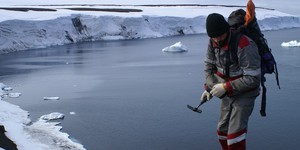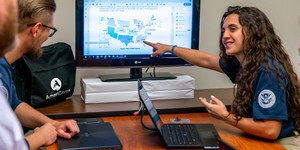Log In
Summary
*Note:
For this science project you will need to develop your own experimental procedure. Use the information in the summary tab as a starting place. If you would like to discuss your ideas or need help troubleshooting, use the Ask An Expert forum. Our Experts won't do the work for you, but they will make suggestions and offer guidance if you come to them with specific questions.
If you want a Project Idea with full instructions, please pick one without an asterisk (*) at the end of the title.
If you want a Project Idea with full instructions, please pick one without an asterisk (*) at the end of the title.
Abstract
What causes landslides? The USGS Landslide Hazards Program conducts research needed to answer major questions related to landslide hazards. Where and when will landslides occur? How big will the landslides be? How fast and how far will they move? What areas will the landslides affect or damage? How frequently do landslides occur in a given locality? Investigate the patterns of landslide occurrence in your area. Are they related to locations, geology, or topography? Are they more frequent after rainy weather? You can also investigate smaller instabilities. What is a sink hole? Sinkholes are common where the rock below the land surface is limestone, carbonate rock, salt beds, or other rocks that can naturally be dissolved by ground water circulating through them. Are there areas near you that meet these conditions and could become a sink hole? (USGS, 2006)Bibliography
USGS, 2006. "Geology Discipline Home Page," United States Geological Survey (USGS) [accessed 3/23/06] http://geology.usgs.gov/.Ask an Expert
Do you have specific questions about your science project? Our team of volunteer scientists can help. Our Experts won't do the work for you, but they will make suggestions, offer guidance, and help you troubleshoot.
Global Connections
The United Nations Sustainable Development Goals (UNSDGs) are a blueprint to achieve a better and more sustainable future for all.
This project explores topics key to Sustainable Cities and Communities: Make cities inclusive, safe, resilient and sustainable.
Careers
If you like this project, you might enjoy exploring these related careers:
Career Profile
Just as a doctor uses tools and techniques, like X-rays and stethoscopes, to look inside the human body, geoscientists explore deep inside a much bigger patient—planet Earth. Geoscientists seek to better understand our planet, and to discover natural resources, like water, minerals, and petroleum oil, which are used in everything from shoes, fabrics, roads, roofs, and lotions to fertilizers, food packaging, ink, and CD's. The work of geoscientists affects everyone and everything.
Read more
Career Profile
There will always be both man-made and natural disasters, like hurricanes, earthquakes, and terrorist attacks, that affect public health and safety. Emergency management specialists are the officials that plan for these disasters—imagining and preparing for the worst—and then coordinating the emergency responses. Emergency management specialists work for local, state, and federal governments, as well as for law enforcement, the military and private agencies to ensure that people…
Read more
Career Profile
Have you ever climbed up high in a tree and then looked at your surroundings? You can learn a lot about your neighborhood by looking down on it. You can see who has a garden, who has a pool, who needs to water their plants, and how your neighbors live. Remote sensing scientists or technologists do a similar thing, except on a larger scale. These professionals apply the principles and methods of remote sensing (using sensors) to analyze data and solve regional, national, and global problems in…
Read more
Related Links
Cite This Page
General citation information is provided here. Be sure to check the formatting, including capitalization, for the method you are using and update your citation, as needed.MLA Style
Science Buddies Staff.
"Landslides." Science Buddies,
20 Nov. 2020,
https://www.sciencebuddies.org/science-fair-projects/project-ideas/Geo_p028/geology/landslides?class=AQWCfa2Zzm5ZqpTcDc-CIKbCiS-w0_gWwbV8Wvh5-BbJrdKHCdFYrtoeG5bppgbR9T4EVu5t7CK2EHXvBYWU-HNxVPuPd8y00dfc13fXydQ_9Q.
Accessed 25 Apr. 2024.
APA Style
Science Buddies Staff.
(2020, November 20).
Landslides.
Retrieved from
https://www.sciencebuddies.org/science-fair-projects/project-ideas/Geo_p028/geology/landslides?class=AQWCfa2Zzm5ZqpTcDc-CIKbCiS-w0_gWwbV8Wvh5-BbJrdKHCdFYrtoeG5bppgbR9T4EVu5t7CK2EHXvBYWU-HNxVPuPd8y00dfc13fXydQ_9Q
Last edit date: 2020-11-20
Explore Our Science Videos
Make a Lung Model – STEM activity
Finding Pi Using Everyday Objects
Make a Balloon Car










